Updated May 2005
There’s something that bores the heck out of me about games today. I hear people talking about games and it’s all hype talk about the next sequel to popular franchise x. There’s the occasional gamer who’s been paying attention to the news bites from companies that appear to be trying to make something new, but mostly I see gamers wanting to get a quick fix from the newest, and most graphically impressive, racer, football game, or whatever.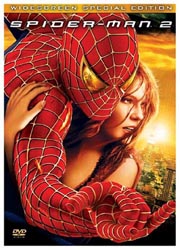 Then there’s the game companies themselves. It seems like most of them aren’t
even trying anymore. I’ve been completely bored of gaming on the PS2, due to
an almost endless string of games that I’ve played before, with little more
than a higher resolution and framerate. Even the ones that proclaim to be “old
school” seem to only be reproducing the worst qualities of old school gaming.
Since when was doing the same level over and over, because you keep getting
suckered to death, fun? This has held true every year on the PS2, all the way
up to 2005.
Then there’s the game companies themselves. It seems like most of them aren’t
even trying anymore. I’ve been completely bored of gaming on the PS2, due to
an almost endless string of games that I’ve played before, with little more
than a higher resolution and framerate. Even the ones that proclaim to be “old
school” seem to only be reproducing the worst qualities of old school gaming.
Since when was doing the same level over and over, because you keep getting
suckered to death, fun? This has held true every year on the PS2, all the way
up to 2005.For example, I had hopes for the Spiderman the Movie game as an average action game. What I got was an almost complete rehash of the first Spiderman on the Playstation, Dreamcast and N64. Sure, there’s better graphics, more fighting moves, and long draw distance. Not to mention blurry textures, stuttering frame rate and no less than 20 seconds of load time between levels, and even from a level to the load screen, at least on the PS2 version. So, I try to enjoy it any way, and I play, and die, and play and beat the level, and play, and die, and play, and beat the level. Is that old school? Is it better than saving after every third step, so it doesn’t really matter that you died? Yes. Is it fun? I argue that it is a symptom of what is to come.
In Contra and the Super Star Wars series it was common to die randomly from countless unavoidable attacks. On a smaller scale, those games attempted to make up for their relative lack of gameplay complexity with "atmosphere". They may well have succeeded, but games today are trying to do the same thing with a totally different intent. They will try to sell you something other than gameplay, often times in an attempt to divert your attention from the fact that the gameplay is weak, in comparison to other similar games.
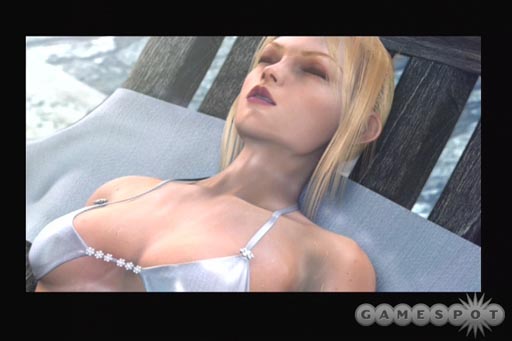 The
media doesn't always catch this bait and switch either, because they like how
commercialized
the Gaming Industry has become. Spiderman The Movie 1+2 have the worst camera
I’ve ever seen in any game. You can turn around and run towards the screen and
it takes a full three seconds to swing back around behind Spidey. And to make
matters worse, when it does spin around, if you were holding down before the
camera moved, and try to switch to up now that the camera is facing up, he’ll
stop, turn around, turn back around, and keep running in the direction he was
running in before. This is caused by a completely stupid gameplay mechanism
that basically turns whatever direction you were holding when the camera moved,
into the 12 O’clock Up position, only to be reset to normal by letting go of
the directional pad for a moment.
The
media doesn't always catch this bait and switch either, because they like how
commercialized
the Gaming Industry has become. Spiderman The Movie 1+2 have the worst camera
I’ve ever seen in any game. You can turn around and run towards the screen and
it takes a full three seconds to swing back around behind Spidey. And to make
matters worse, when it does spin around, if you were holding down before the
camera moved, and try to switch to up now that the camera is facing up, he’ll
stop, turn around, turn back around, and keep running in the direction he was
running in before. This is caused by a completely stupid gameplay mechanism
that basically turns whatever direction you were holding when the camera moved,
into the 12 O’clock Up position, only to be reset to normal by letting go of
the directional pad for a moment. I play a game like that, and then go back and play Sonic Adventure 2, or Virtual On Oratorio Tangram, both games that were labeled flawed, specifically for camera view related issues. Rather than what the media told me I'd see, I see a camera that is always pointing in the right direction, and directional controls that never turn themselves around in a futile attempt to compensate for camera movement.
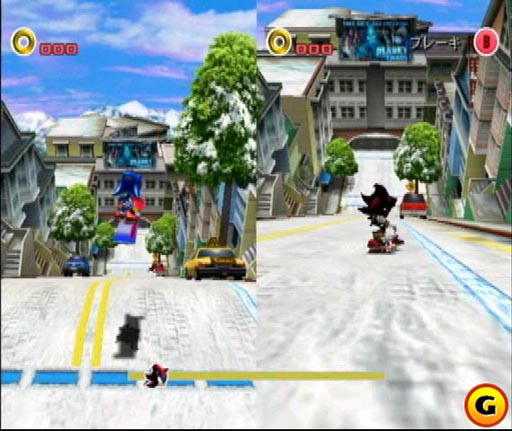 Sonic Adventure 2’s camera constantly points the player in the direction of the end of the level in the Sonic levels and the shooter levels, and the player determines what direction to point it in the treasure hunting levels. No camera problem there, yet everyone agrees that the game is terrible due to it’s “camera problem”, of not letting you point it at a wall and keep it there, when you’re supposed to be running forward.
Sonic Adventure 2’s camera constantly points the player in the direction of the end of the level in the Sonic levels and the shooter levels, and the player determines what direction to point it in the treasure hunting levels. No camera problem there, yet everyone agrees that the game is terrible due to it’s “camera problem”, of not letting you point it at a wall and keep it there, when you’re supposed to be running forward.
VOOT was accused of being unplayable without an expensive twin stick peripheral. Yet it’s not only fully playable with the standard DC controller, I can play it better that way. People argue that media bias and the commercialization of the Industry is a good thing for gaming, yet due to their lack of popularity, the great gameplay found in both of the games has never even been attempted in another non-Sega game. Which presents a problem, since in using Sega games as examples of superior effort, the fans of the mass-market consoles immediately label you "fanboy", support themselves with straw man arguments, and continue on their policing of Usenet, message boards, and game magazines, purifying the Industry of any taint of anti-mass-market sentiment.

No games attempt fast action like these two games do, and in the place of that, we get rehashes, and truly flawed games, passed off as original offerings with a $50 price tag. Fans of these mass-market consoles support this, claiming that it is progress and that gaming was suffering as a medium when this kind of thing didn't exist on the market. They also claim that it doesn't matter that you have to sort through a library that is 90% derivative mass-market junk, because in their eyes the other 10% of "quality" titles add up to a greater number than the number of quality titles released on any other game console.
I’ve been doing a lot of collecting of older games lately, and I’m noticing a trend I never noticed before. The most talked about games, are also the ones that include more menial tasks, insta-deaths, and sheer lack of complexity. In Shinobi III, which has been sitting on my shelf since 1993, Musashi can sprint, jump, jump kick, flip, throw eight shuriken, land, optionally block at this point, and then dive forward with a lethal sword strike, all in one continuous motion, killing up to eight attackers at once, all of which is complemented with excellent art design. What makes Shinobi III even better is that the enemies also react to your movements by flipping over you and throwing shuriken from odd angles, rather than just walking back and forth, or straight at you without reaction.
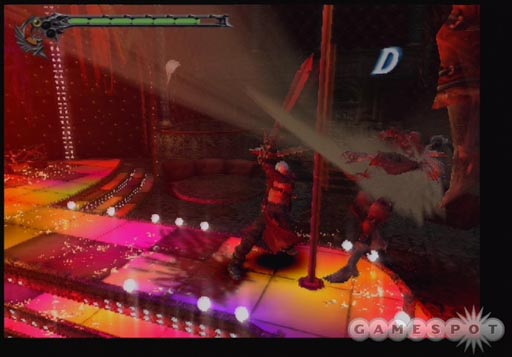 Then
I pop in Metal Gear Solid or Tenchu, and I see two clumsy looking characters,
and the token half dressed woman, and then I find that I have to hit a single
virtually helpless enemy three to eight times, before they finally fall down.
That is, unless you can get them from behind and do some "cinematic"
kill sequence. What happened to style? What happened to sprinting into a room,
flipping over three enemies, springing off a wall, blocking a bullet with your
sword, and taking them all out with fluid, well conceived and well designed
moves? I look at Devil May Cry, and I see a step in the right direction, and
then three steps back. Its use of weird “spooky” camera angles, its inclusion
of the same stupid direction control problem that Spiderman has, and its focus
on random but “cinematic” instant deaths are distracting. Devil May Cry as a
series is a perfect example of what is happening to gaming. Substance and polish
in gameplay, AI and level design is replaced by "cinematics" which
try to sell you on the idea that presentation is actually cinematics in the
first place.
Then
I pop in Metal Gear Solid or Tenchu, and I see two clumsy looking characters,
and the token half dressed woman, and then I find that I have to hit a single
virtually helpless enemy three to eight times, before they finally fall down.
That is, unless you can get them from behind and do some "cinematic"
kill sequence. What happened to style? What happened to sprinting into a room,
flipping over three enemies, springing off a wall, blocking a bullet with your
sword, and taking them all out with fluid, well conceived and well designed
moves? I look at Devil May Cry, and I see a step in the right direction, and
then three steps back. Its use of weird “spooky” camera angles, its inclusion
of the same stupid direction control problem that Spiderman has, and its focus
on random but “cinematic” instant deaths are distracting. Devil May Cry as a
series is a perfect example of what is happening to gaming. Substance and polish
in gameplay, AI and level design is replaced by "cinematics" which
try to sell you on the idea that presentation is actually cinematics in the
first place.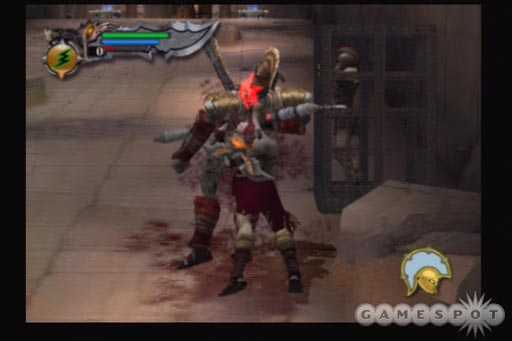 Overall we’ve seen some weak offerings in the action genre for the 128-bit generation.
Sure, there's been a marked increase in the complexity of the minority of offerings
in the FPS genre, and RPGs have more robust menu systems and better cinematic
sequences, but the focus is self admittedly changed. The Industry became commercialized,
thanks to Sony, and now Microsoft, and it now focuses away from the gaming hobbyist,
and to the non-gaming populous.
Overall we’ve seen some weak offerings in the action genre for the 128-bit generation.
Sure, there's been a marked increase in the complexity of the minority of offerings
in the FPS genre, and RPGs have more robust menu systems and better cinematic
sequences, but the focus is self admittedly changed. The Industry became commercialized,
thanks to Sony, and now Microsoft, and it now focuses away from the gaming hobbyist,
and to the non-gaming populous. The one who grew up cutting his teeth and increasing his skills on gaming systems, simply doesn't matter to these companies. Rather than selling games based on their gameplay originality and complexity, games are now sold by standard commercialism, which typically sells one of two things. The determination of what those two things are will be left to the reader, but it ought to be completely obvious that they rarely, if ever, have anything to do with gameplay, in the traditional sense that gamers grew to know.